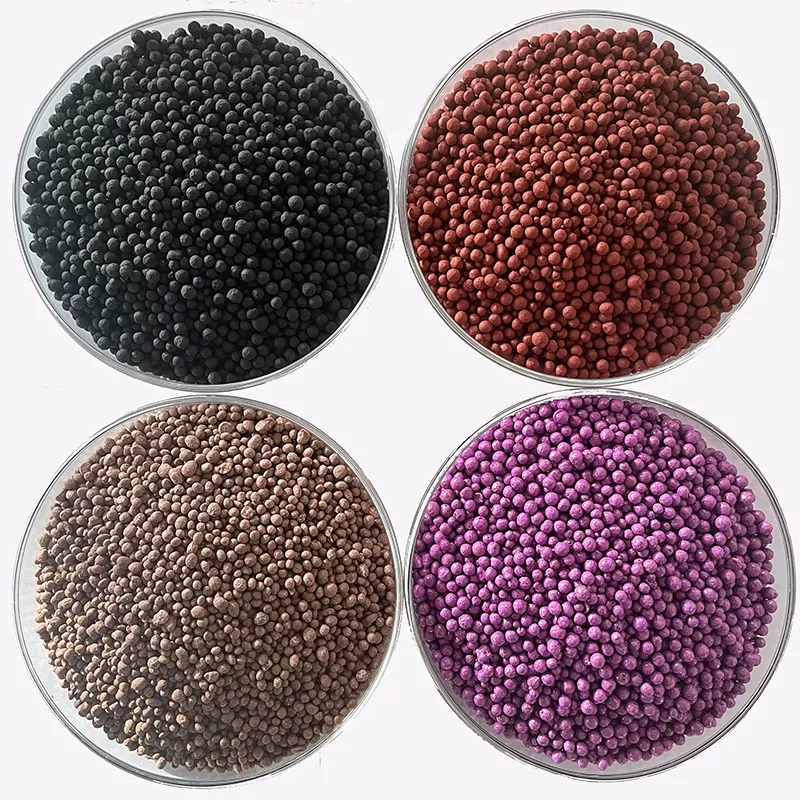
Dec . 04, 2024 19:31 Back to list
Balanced NPK 17-17-17 Fertilizer for Optimal Plant Growth and Yield Boosting
Understanding High-Quality NPK 17-17-17 Fertilizer
Fertilizers play a vital role in modern agriculture, serving as a critical component in enhancing soil fertility and promoting healthy plant growth. Among various fertilizers available in the market, NPK fertilizers are some of the most prominent. NPK stands for Nitrogen (N), Phosphorus (P), and Potassium (K), the three essential nutrients that significantly influence plant growth and development. The NPK ratio indicates the percentage of these nutrients in a fertilizer. In this article, we will focus on high-quality NPK 17-17-17 fertilizer, its characteristics, benefits, and application techniques.
The Composition of NPK 17-17-17 Fertilizer
The NPK 17-17-17 fertilizer contains equal amounts of nitrogen, phosphorus, and potassium, each contributing equally to the nutritional needs of plants. Specifically, a 17-17-17 NPK fertilizer consists of 17% nitrogen, 17% phosphorus, and 17% potassium. This balanced formulation makes it an excellent choice for various crops and soil types.
- Nitrogen is crucial for vegetative growth as it is an essential component of amino acids and proteins, promoting lush green foliage and strong stems. - Phosphorus is vital for root development, flowering, and fruiting. It plays a significant role in energy transfer within the plant, supporting the formation of DNA and RNA.
- Potassium helps in overall plant health, enhancing disease resistance, water regulation, and improving fruit quality. It aids in photosynthesis and carbohydrate synthesis, ensuring that plants have the energy they need to thrive.
Benefits of NPK 17-17-17 Fertilizer
1. Balanced Nutrient Supply One of the biggest advantages of using high-quality NPK 17-17-17 fertilizer is its balanced nutrient content, which supports various stages of plant growth. Whether you’re cultivating vegetables, fruits, or ornamental plants, this fertilizer can meet the comprehensive nutritional needs of your crops.
2. Enhanced Crop Yields The balanced ratio of nutrients ensures that plants receive adequate nutrition, which can result in higher yields and improved quality of produce. This is especially beneficial for farmers seeking to maximize their agricultural output.
3. Soil Health Improvement Regular application of NPK fertilizers can enhance soil fertility over time. Nitrogen contributes to organic matter formation, phosphorus improves soil structure, and potassium aids in nutrient retention.
high quality npk 17-17-17 fertilizer

4. Versatility NPK 17-17-17 fertilizer can be applied across a wide range of soil types and crops. It is suitable for both indoor and outdoor gardening, making it a versatile choice for gardeners and farmers alike.
Application Techniques
To achieve optimal results with NPK 17-17-17 fertilizer, proper application techniques are essential
1. Soil Testing Before applying any fertilizer, it is crucial to conduct a soil test to determine existing nutrient levels. This helps in adjusting the fertilizer application to meet specific soil needs.
2. Application Timing The timing of fertilizer application is critical. For many crops, a split application—in which fertilizer is applied at different growth stages—can be more effective. This ensures that plants receive nutrients as needed.
3. Method of Application NPK 17-17-17 can be applied as a granular fertilizer, incorporated into the soil, or used in liquid form for foliar feeding. The method of application can vary based on crop type, growth stage, and environmental conditions.
4. Watering Adequate watering after application is essential to help dissolve the fertilizer and ensure that nutrients are readily available to the plant roots.
Conclusion
High-quality NPK 17-17-17 fertilizer provides a well-balanced nutrient solution that supports robust plant growth. Its equal distribution of nitrogen, phosphorus, and potassium makes it a suitable choice for various agricultural applications. By understanding its benefits and proper application techniques, farmers and gardeners can effectively enhance their crop yields and contribute to improved soil health. Embracing such fertilizers plays a crucial role in sustainable agriculture practices, ensuring a productive and environmentally friendly approach to growing food.
-
Organic 10-10-10 Fertilizer | Balanced Plant Nutrients
NewsJul.31,2025
-
Premium Amino Acid Fertilizer | Rapid Plant Growth Booster
NewsJul.31,2025
-
10 10 10 Fertilizer Organic—Balanced NPK for All Plants
NewsJul.30,2025
-
Premium 10 10 10 Fertilizer Organic for Balanced Plant Growth
NewsJul.29,2025
-
Premium 10 10 10 Fertilizer Organic for Balanced Plant Growth
NewsJul.29,2025
-
Premium 10 10 10 Fertilizer Organic for Balanced Plant Growth
NewsJul.29,2025
